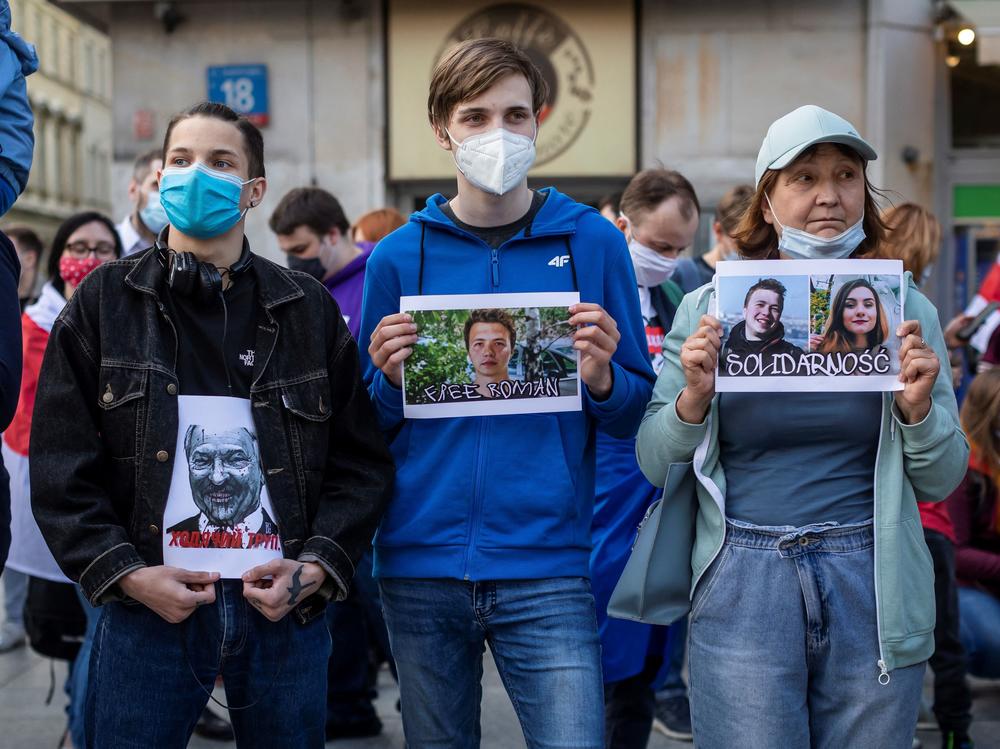Section Branding
Header Content
EU Asks All EU-Based Airlines To Avoid Belarusian Airspace After Forced Landing
Primary Content
Updated May 24, 2021 at 6:59 PM ET
The European Union is calling on all airlines based in the bloc to avoid flying over Belarusian airspace. The move is a major blow to the Belarusian regime, a day after Belarusian officials forced the diversion of an international commercial flight in order to apprehend 26-year-old opposition activist Roman Protasevich.
The decision was announced during a summit of EU leaders in Brussels on Monday evening.
International outrage has followed the emergency landing on Sunday. Belarus ordered a Ryanair flight to make an emergency landing in the capital city of Minsk, after reports a bomb was aboard the aircraft. Belarusian officials scrambled a jet to intercept the flight, then entered the plane and arrested Protasevich, who is the former editor and founder of an opposition blog and social media channel Nexta.
"Ordinary citizens' lives were in danger," Ireland's minister for European affairs, Thomas Byrne, told NPR's All Things Considered. "This is wrong, it's illegal and quite frankly it could happen to any of us, so we cannot allow this to happen anywhere in the world."
The EU also asked the European Council to begin the process of banning Belarusian airlines from flying over EU airspace or landing in its airports — a move that will effectively block the country's air connections to Western Europe. Belarus is not a member of the European Union.
European Commission President Ursula von der Leyen called the forced landing a "hijacking."
Following the EU news, Dutch airline KLM and German carrier Lufthansa said they were halting flights over Belarus, Reuters reports.
Even before departing the Athens airport en route to Lithuania's capital of Vilnius, Protasevich messaged colleagues that he had noticed a suspicious man following him and taking pictures before he and his partner, Sofia Sapega, got on the flight.
When the plane abruptly altered course to make the unplanned landing in Minsk, fellow passengers recalled Protasevich saying that he would be executed in Belarus.
A video of the opposition activist appeared on Belarusian pro-government social media, in which Protasevich said he incited mass disorder. He said he has no health issues and is being treated well.
Exiled Belarusian opposition leader Svetlana Tikhanovskaya tweeted that in the video Protasevich looks like he's "under physical and moral pressure."
Alexander Lukashenko, Belarus' authoritarian leader, is in his sixth term in office after declaring himself the winner of an election held in August. Protasevich was born in 1995, a year after Lukashenko came into power.
Protasevich became a political activist as a teenager, and left Belarus in 2019. When massive, anti-government protests broke out last year after the election, his Telegram channel became a key resource for opposition activists to coordinate and plan their actions.
With Russian support, Lukashenko has remained in power. Neither the European Union nor the U.S. recognizes Lukashenko as legitimate, imposing sanctions on his inner circle.
"Lukashenko is really waging a war now against any dissent be it inside the country or outside of the country," says Katia Glod, a fellow with the Center for European Policy Analysis in Washington, D.C.
She says Protasevich's arrest was motivated by both personal revenge and an attempt to silence all media critical of the government: "They pose very direct threats to the regime, because they are the ones who mobilize the population and then they inform people in Belarus."
NPR correspondent Rob Schmitz contributed to this report from Europe.
Copyright 2021 NPR. To see more, visit https://www.npr.org.

